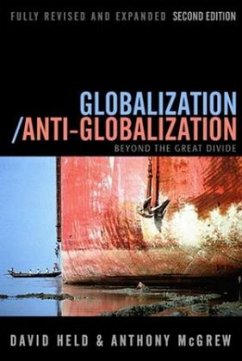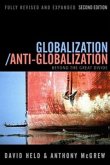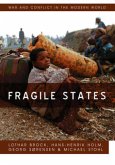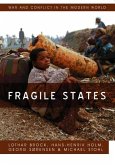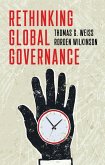Is globalization being eclipsed by a resurgent geopolitics? Does the war on terror denote the end of globalization or a new phase of militarized globalization? Empire or globalization - are these the right terms to describe the current global order?
The second edition of this highly successful book tests the claims of those who dismiss the continuing significance of globalization through a comprehensive assessment of contemporary global trends. In the aftermath of 9/11, and the war in Iraq, there has been much talk of the end of globalization. Held and McGrew argue that these post-mortems for globalization are entirely premature. They show this by focusing upon the primary structures of world order namely: patterns of governance, organized violence, the economy, culture and environmental degradation. Patterns of inequality, exclusion and domination are also assessed.
Building upon this analysis, the authors present the case for continuing to take globalization seriously as both a description and explanation of our current global condition. They also ask the vital question: can globalization be tamed? Held and McGrew explore whether a more just and stable world order is either desirable or feasible and present an alternative ethical and political agenda for the twenty-first century - a global covenant of cosmopolitan social democracy.
The second edition of this powerful and original book has been comprehensively updated, with three new chapters added. The book will appeal to all those who remain intrigued, confused or simply baffled by the controversy about globalization and its consequences for the twenty-first century world order.
Hinweis: Dieser Artikel kann nur an eine deutsche Lieferadresse ausgeliefert werden.
The second edition of this highly successful book tests the claims of those who dismiss the continuing significance of globalization through a comprehensive assessment of contemporary global trends. In the aftermath of 9/11, and the war in Iraq, there has been much talk of the end of globalization. Held and McGrew argue that these post-mortems for globalization are entirely premature. They show this by focusing upon the primary structures of world order namely: patterns of governance, organized violence, the economy, culture and environmental degradation. Patterns of inequality, exclusion and domination are also assessed.
Building upon this analysis, the authors present the case for continuing to take globalization seriously as both a description and explanation of our current global condition. They also ask the vital question: can globalization be tamed? Held and McGrew explore whether a more just and stable world order is either desirable or feasible and present an alternative ethical and political agenda for the twenty-first century - a global covenant of cosmopolitan social democracy.
The second edition of this powerful and original book has been comprehensively updated, with three new chapters added. The book will appeal to all those who remain intrigued, confused or simply baffled by the controversy about globalization and its consequences for the twenty-first century world order.
Hinweis: Dieser Artikel kann nur an eine deutsche Lieferadresse ausgeliefert werden.
Acclaim for the first edition:
"This is an excellent interpretation of current debates on the subject ... it will be widely adopted."
American Journal of Sociology
"Extremely successful as a short and concise summary of the globalization debate ... and is an ideal teaching resource."
Australian Journal of Political Science
"This is a brief and extremely useful book, helpful in particular for bringing some order into the chaos of the globalization debate; and helpful also in that it does not tell a one-sided story. For students of globalization, undergraduate or postgraduate, this little book should be an absolute must."
Environmental Politics
Acclaim for the second edition:
"This book provides a masterly and comprehensive survey of the political and intellectual debates over globalization that have raged for the past two decades. It is indispensable reading for anyone interested in finding out what these debates have been about and why they matter."
Andrew Gamble, University of Cambridge
"Globalization/Anti-Globalization is the best available account of the complexities of globalization. The authors state fairly a variety of points of view, present a vast amount of up-to-date evidence, and make a clear argument of their own ... highly recommended for university courses and for the general reader."
Robert O. Keohane, Princeton University
"Held and McGrew's second edition of Globalization/Anti-Globalization is a thoroughgoing revision of an already outstanding book. Held and McGrew do more than survey the field: they discuss how we might respond to globalization and how we could construct an effective politics to lessen its major negative consequences whilst improving the lives of the vast bulk of the world's population. This is a stunningly impressive book - a must-have reference work on the central debates within the globalization literature."
Steve Smith, University of Exeter
"This is an excellent interpretation of current debates on the subject ... it will be widely adopted."
American Journal of Sociology
"Extremely successful as a short and concise summary of the globalization debate ... and is an ideal teaching resource."
Australian Journal of Political Science
"This is a brief and extremely useful book, helpful in particular for bringing some order into the chaos of the globalization debate; and helpful also in that it does not tell a one-sided story. For students of globalization, undergraduate or postgraduate, this little book should be an absolute must."
Environmental Politics
Acclaim for the second edition:
"This book provides a masterly and comprehensive survey of the political and intellectual debates over globalization that have raged for the past two decades. It is indispensable reading for anyone interested in finding out what these debates have been about and why they matter."
Andrew Gamble, University of Cambridge
"Globalization/Anti-Globalization is the best available account of the complexities of globalization. The authors state fairly a variety of points of view, present a vast amount of up-to-date evidence, and make a clear argument of their own ... highly recommended for university courses and for the general reader."
Robert O. Keohane, Princeton University
"Held and McGrew's second edition of Globalization/Anti-Globalization is a thoroughgoing revision of an already outstanding book. Held and McGrew do more than survey the field: they discuss how we might respond to globalization and how we could construct an effective politics to lessen its major negative consequences whilst improving the lives of the vast bulk of the world's population. This is a stunningly impressive book - a must-have reference work on the central debates within the globalization literature."
Steve Smith, University of Exeter

